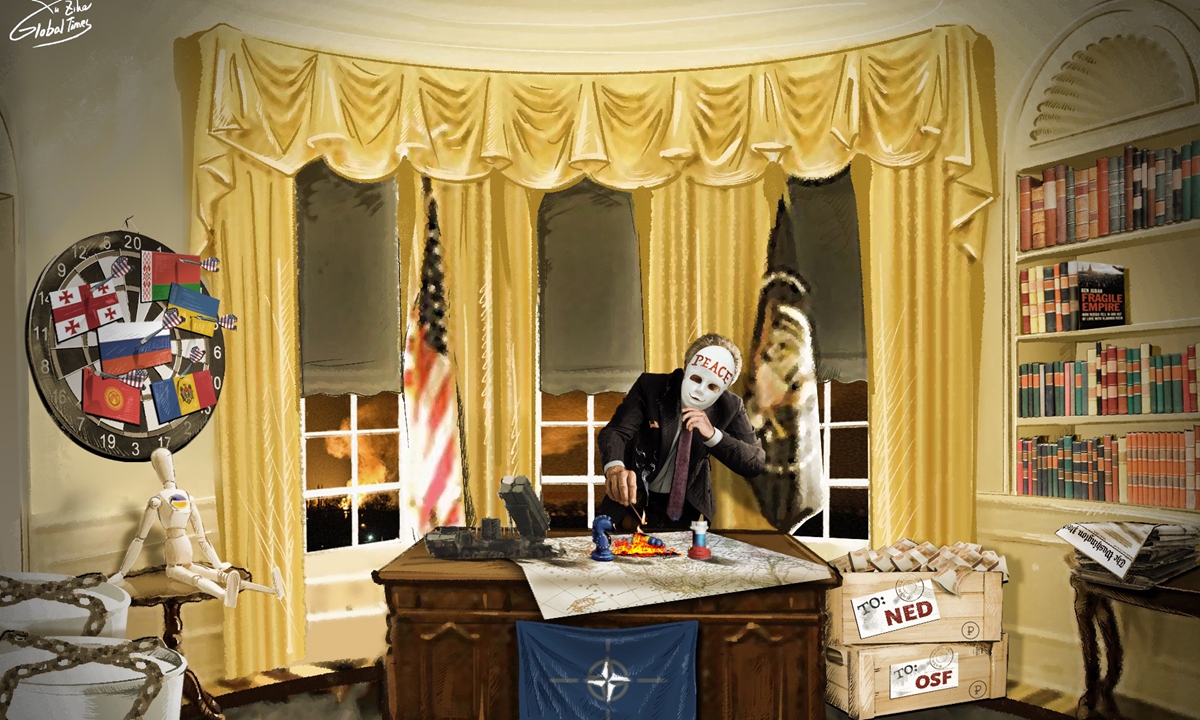
Unmasking the superpower: Where the Ukraine crisis started Cartoon: Xu Zihe/GT
The Russia-Ukraine stalemate on the battlefield is likely to continue along with the damage to people's lives and economy, Chinese experts warned on Friday, after Ukraine dismissed Russia's 36-hour ceasefire offer over Orthodox Christmas, at a time when US and its NATO allies announced they would send armored fighting vehicles to Ukraine.
The situation shows that the conditions for peace talks between Russia and Ukraine are far from ripe, as the weapons aid to Ukraine has exposed that the West is still trying to seize every opportunity to knock Russia down, instead of defusing the situation, analysts said.
Russian President Vladimir Putin on Thursday ordered a 36-hour ceasefire in Ukraine over Orthodox Christmas. According to a statement released by the Kremlin, the Russian president has instructed his defense minister to introduce a ceasefire along the entire line of contact in Ukraine from 12:00 on Friday to 24:00 Saturday.
"As a large number of Orthodox Christians reside in the area of hostilities, we call on the Ukrainian side to declare a ceasefire to allow them to attend church services on Christmas Eve as well as on Christmas Day," Putin said in the statement.
The announcement came hours after the head of the Russian Orthodox Church, Patriarch Kirill I, called for a ceasefire. Turkish President Recep Tayyip Erdogan also called for a ceasefire during a phone call with Putin on Thursday.
However, Russia's rivals remain skeptical. Ukrainian President Volodymyr Zelensky responded on Thursday by saying that Russia wants to use the festival "as a cover" to halt Ukrainian advances and use the lull to reinforce its own strength. Ukrainian presidential adviser Mykhailo Podolyak rejected Russia's proposal, calling it "hypocrisy."
In Washington, US President Joe Biden said Russia is trying to "find some oxygen" with the ceasefire announcement. Also on Thursday, the White House announced that the US, along with Germany, will send armored fighting vehicles to Ukraine to boost Kiev's military strength.
The US is providing Bradley fighting vehicles, while Germany will send Marder infantry fighting vehicles. The two also agreed to send additional Patriot missile batteries to Ukraine, according to a Financial Times report.
France, another US NATO ally, also agreed to supply Ukraine with the AMX-10RC light tank on Wednesday, following talks between French President Emmanuel Macron and Zelensky.
Zhang Hong, a senior research fellow at the Institute of Russian, Eastern European and Central Asian Studies of the Chinese Academy of Social Sciences, said that Putin's ceasefire proposal is an unsolicited signal of easing tensions.
"It may be a diplomatic fishing expedition, an attempt to find some conciliatory atmosphere, or to create some kind of goodwill," Zhang told the Global Times on Friday.
Regarding the negative response from Ukraine and the US, Zhang said the key disagreement in the Ukraine-Russia conflict is over territory, with Russia welcoming peace talks based on the status quo, while Ukraine and the West are demanding a return to the border before 2014.
When it comes to the core issues of territory and sovereignty, it is almost impossible for Russia, Ukraine and the West to achieve consensus, said Zhang, "A brief ceasefire will not change the vast differences in the interests of the parties. And the conditions for the current ceasefire negotiations are far from mature."
Yang Jin, another Eastern European studies expert at the Chinese Academy of Social Sciences, told the Global Times that some European countries no longer import energy from Russia, which is why Germany and France stand in line with the US on military aid to Ukraine.
Weapons and vehicles aid from the West will help the Ukraine army narrow its gap with Russia, which means the stalemate on the battlefield will continue, Yang said. "The continuation of the conflict costs not only people's lives and hurts the economy, but also damages people's psychology, which is something the peace-loving people of the world do not want to see."
During a video call between Chinese and Russian leaders on December 30, 2022, Chinese President Xi Jinping stressed that the path to peace talks will not be a smooth one, but as long as the parties involved do not give up, there will always be prospects for peace.
China will continue to hold an objective and impartial position, work to build synergy in the international community and play a constructive role toward peaceful resolution of the Ukraine crisis, Xi said.
China's position on the Russia-Ukraine conflict is neutral, and it has always called for a political and peaceful settlement, Yang said.
As a responsible major country, China is willing to create conditions for peace. However, the key to resolving the crisis lies not with China, but with both sides of the conflict and the forces involved, such as the US and NATO, the expert added.




